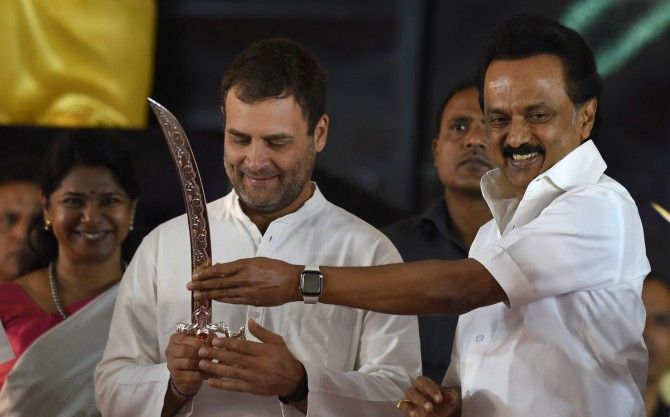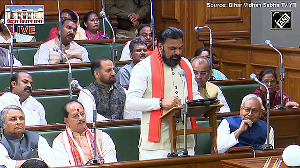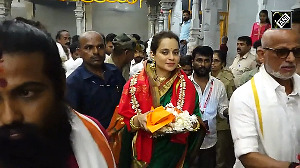For Stalin and the DMK, the declaration was the essence of the commencement of seat-sharing talks with the Congress, and even more, the launch of their combined campaign for the LS polls. That meant the DMK had to send out a message also to the ‘minorities’ in the state, who had deserted the DMK and very badly at that in the critical, post-Jaya R K Nagar assembly bypolls last year, says N Sathiya Moorthy.

The occasion was not one for a regional partner in the Congress-UPA to pronounce party president Rahul Gandhi as the prime ministerial candidate of the ‘common Opposition’, that too without possible consultation within the existing combine and other national and regional parties that also want the BJP-NDA and Prime Minister Narendra Modi defeated in the Lok Sabha polls of May 2019.
Yet, the DMK’s young president M K Stalin, hosting his first ‘national Opposition conclave’ of a kind, did precisely that. In his speech at the party-organised function where UPA chief Sonia Gandhi unveiled late DMK supremo M Karunanidhi’s statue at Chennai on Sunday, Stalin left his proposal at that, without exactly seeking endorsement from the other national and regional leaders from non-Congress, non-DMK parties who were on the dais.
Going by post-Chennai media reactions of leaders from other parties who were present on the occasion, and those who were not present but may still join hands with the Congress, pre-poll or post-poll, Stalin did not seem to have consulted or informed them before making his declaration.
And, why?
Stalin was not addressing a national audience, or national party leaders, on this issue. Nor may have the DMK closed its post-poll options. The party is also equally aware of Rahul Gandhi’s weeks-old declaration that the Congress was ready to discuss the prime ministerial issue with other partners, post-poll.
For Stalin and the DMK, the declaration was the essence of the commencement of seat-sharing talks with the Congress, and even more, the launch of their combined campaign for the LS polls. That meant the DMK had to send out a message also to the ‘minorities’ in the state, who had deserted the DMK and very badly at that in the critical, post-Jaya R K Nagar assembly bypolls last year.
Apart from the fact that the ruling AIADMK ‘rebel’ candidate T T V Dhinakaran of what is now the ‘Amma Makkal Munnetra Kazhagam’ swept the by-election by a huge margin, the DMK nominee also lost his security deposit. Suburban R K Nagar constituency in Chennai being a microcosm of Tamil Nadu, with near-equitable distribution of various castes and communities, rural-urban and rich-poor divide, though not of the elite variety so to say, the bypoll result was a big shock for the DMK leadership and strategists alike.
Their post-poll analysis showed that the DMK defeat owed to the ‘money factor’ allegedly linked to Dhinakaran and also the ruling AIADMK. As they claimed, Stalin in particular had strictly discouraged the ‘cash-for-vote’ concept, both as a new party policy and also to avoid getting caught by local police officials whom DMK cadres claimed were partisan.
Yet, the DMK had hoped to either win the bypoll, given the division of AIADMK votes, or getting the second slot, pushing one or the other of the ruling party factions to the third slot. The shocking loss of deposit for the party meant only one thing for the DMK strategists. It meant that the ‘minorities’ had deserted the party wholesale.
And the reason?
Only weeks before the bypolls, Prime Minister Narendra Modi, almost out of the blue, decided to call on ailing supremo Karunanidhi at his Gopalapuram residence in the city, and at short notice. Stalin, who was holidaying in the Gulf, rushed to receive the PM, after being sounded out reportedly by none other than the BJP boss Amit Shah.
Even without the Modi visit, the local media had begun speculating earlier that the BJP was keeping the DMK option for the LS polls in Tamil Nadu open, as the party was not sure of the ability of either or both the AIADMK factions, separately or together, to ‘deliver’ the state’s 40 LS seats, including the one in Puducherry UT, to the NDA in elections 2019.
All of it seemed to have convinced the ‘minority voters’ from the Muslim and Christian communities, as also a section of the local Dalits uncomfortable with the BJP’s brand of ‘casteist Hindutva’, as some dubbed it, to vote en bloc for Dhinakaran. Or, so went the DMK’s post-poll analysis, it is said.
According to some, these sections of the state’s voters, and many more, were also convinced that the new AIADMK leadership, more than under the late chief minister Jayalalithaa, was ‘more BJP than the state BJP’. Ironically, these voters were convinced that the AIADMK leadership would wilt under the weight of investigations by central agencies, whereas they were even more convinced that Dhinakaran and his jailed aunt V K Sasikala Natarajan would become more diffident than earlier owing to similar actions against them. The logic was illogical to say the least, but that however was the minorities’ voter-mood.
The DMK is convinced that sending out wrong signals, or no convincing signals, to the Congress at this stage could lead to a continuing split in the ‘minorities’ vote share in the state ahead of the LS polls. The Stalin leadership wanted to strike the iron when it was hot, and not chase the minorities’ votes after some sections thereof had jumped to avoidable pre-conceived conclusions.
There is another, more immediate reasons. A full 50 years-plus after losing power in the state, the Congress in Tamil Nadu is less than a shadow of its original self. Independent pollsters do not put the party’s stand-alone vote-base at anything more than five per cent, some uncharitable sections putting it at even half that figure.
Yet, the Tamil Nadu Congress is a store-house of yesteryear leaders, who are spent forces in reality. Yet, in any seat share talks with the DMK ally in an anti-BJP election of the kind, state Congress leaders, who all are aspiring candidates for LS and/or assembly tickets, have been able to convince the high command of their need for contesting at every turn.
These Congress leaders have also been able to convince the high command to demand and obtain from the DMK ally in particular a higher number of votes than the party’s real strength could justify -- all because of the pro-minority image of the Congress, as much in the state as at the national level.
As late Karunanidhi went public with the Congress’s contribution to the alliance in the 2016 assembly elections, the party could win only eight of the 41 seats that the high command forced the regional partner to part with. In most other seats, the Congress candidates fared too badly to give any hope for the future.
This was in an election in which the DMK combine, which included the IUML, obtained 40 per cent votes against the victorious AIADMK’s 41 per cent -- a mere one per cent margin. But that was enough to make the difference to seat shares. With polling for two seats countermanded, the AIADMK bagged 136 seats against the DMK combine’s 98, including the Congress’s eight, in the 234-member state assembly.
The story was no different or no better earlier, either. As if by putting the gun at DMK’s head, the ruling Congress ally at the Centre obtained an ‘unimaginatively high’ number of 68 seats in elections 2011, again for the state assembly. Apart from the 2-G scam, the poor performance by Congress candidates did in the alliance, according to the DMK’s reported post-poll analysis at the time.
Hence the DMK’s reported decision to break away from the Congress in the crucial LS polls of 2014, in which both fared badly, going beyond Jaya’s ‘Lady vs Modi?’ question to the state’s voters and the otherwise sweeping ‘Modi effect’ elsewhere across the country.
Now, by jumping the gun and declaring Rahul as the DMK’s prime ministerial favourite, Stalin seems to have sent out a public message to the Congress high command, to cooperate with his party on seat-sharing and seat-identification process, without falling prey to the machinations of failed party leaders in the state.
Even without it all, Stalin has a real problem on hand. Having branded Modi as a ‘failed PM’ and his government as ‘anti-minorities’, et al, a host of parties, both national and regional, are knocking at the DMK’s doors for seats, which they have concluded they could win only in the combined DMK-Congress company.
The list includes the CPI, CPM, MDMK, VCK, and possibly the PMK and the DMDK. They may have an option in the Dhinakaran’s AMMK, or even the AIADMK sans BJP, as their cadres are not favourably disposed to such an idea.
Barring the PMK, which came a distant third with 5.6 per cent vote-share in the 2016 assembly polls despite a long and massive campaign, other aspiring allies of the DMK combine have even fewer votes than the Congress, but without value addition in the form of pro-minorities image or a possible prime ministerial candidate in Rahul Gandhi, now.
Worse still, like in the state Congress, there are enough aspirants for an LS ticket in these parties, and their leadership’s political ego too would not permit them to settle for fewer seats than what could convince their cadres. With Stalin still seen as young and unsure of himself (as some of these aspiring allies seem to have concluded), they too would want to strike when the iron is hot -- or, not too hot.
Against this background, Stalin would have to ensure that the Congress is on his side fully and whole-heartedly and would settle for a reasonable share of LS seats, without insisting on numbers that the DMK cadres cannot see his leadership as yielding just now. He may then be able to negotiate from a position of relative strength with other aspiring allies.
However, Stalin’s task may have been made more difficult by the perceived weakening of Dhinakaran’s AMMK and his voters going back to the parent party ahead of the LS polls. This could mean that the DMK strategists would have to look at vote-shares closer to the 2016 proportions even if the party were to be considered the favourite.
This would mean that the DMK could not afford to let these other aspiring allies to go the AIADMK camp, rather the party would want to get all those seats for the combine, however small their individual shares may be -- but without enough number of seats to spare them, the demands for which may be disproportionate to their real strength, independent of the cumulative value addition it might entail.
This should also explain why the DMK leadership chose not to seat MDMK’s Vaiko and VCK’s Thol Thirumavalavan at the statue function dais alongside Sonia and Rahul, but provided them seats in the front audience row. There is also the unpredictable ‘pro-LTTE’ calls of these two aspiring allies, which at times end up taking an ‘anti-national’ tone and an ‘anti-Congress’ tenor, leaving the DMK and Congress partners possibly embarrassed and the BJP rival at the high end on the ‘nationalist’ campaign, in the state and outside.
N Sathiya Moorthy, veteran journalist and political analyst, is director, Observer Research Foundation, Chennai Chapter.











 © 2025
© 2025